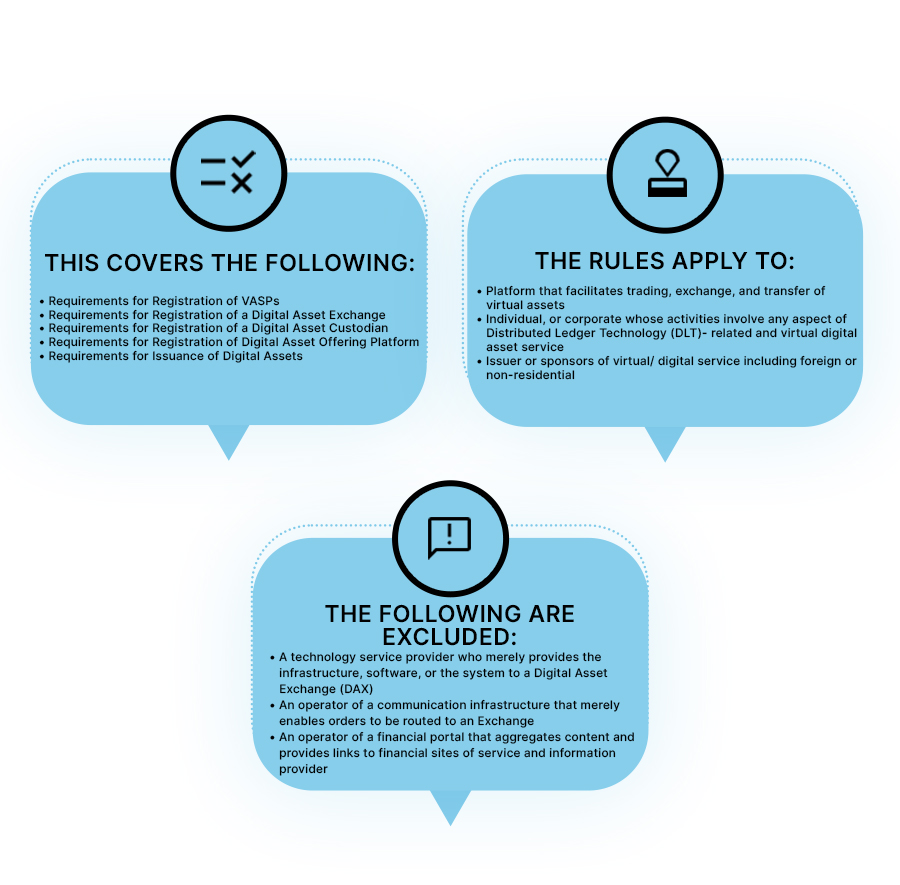Digital assets are defined as digital token that represents assets such as a debt or equity claim on the Issuer.
The SEC rules were created to provide for the issuance, offering, and custody of digital assets to Nigerians by any service provider. The rules are divided into five parts;
- Rules on the insurance of Digital Assets as Securities
- Rules on registration requirement for Digital Assets Offering Platforms (DAOPs)
- Rules on registration requirement for Digital Assets Custodians (DACs)
- Rules on virtual Assets Service providers (VASPs)
- Rules on Digital Assets Exchange
Rules on the Insurance of Digital Assets as Securities
This rule relates to businesses planning to raise capital through digital asset offerings.
- The issuer is to submit an assessment form and a white draft, The draft whitepaper shall contain relevant, complete, and current information regarding the initial digital asset offering projects, business plan, and feasibility study.
- In the case of white paper, a disclaimer should be printed on the white paper that it does not represent an offer to sell, and it shall be filled for every proposed digital asset offering.
- The commission shall within 30 days review the assessment filling and if it determines the digital asset as a security, the issuer shall apply to register the said security.
- The issuer director and management all together shall own 50% equity holding on the date of the issuance of the digital assets.
- They may not sell or assign more than 50% after issuance of the digital assets until the initial digital asset offering project is complete.
Rules on Registration Requirement for Digital Assets Offering Platform (DAOPs)
- To register a DAOP, the applicant is expected to pay the following fees:
- filling/application fee – #100,000
- processing fee – #300,000
- registration fee -#30,000,000
- sponsored individual fee – #100,000
- A required minimum paid-up capital of #500,000,000 (bank balance, fixed asset, or investment in quoted security) and the current fidelity bond covering at least 25% of the minimum paid-up capital.
3. A DAOP shall have a board, the membership of which shall be subject to the approval of the Commission before registration at the CAC.
Rules on Registration Requirement for Digital Assets Custodians (DACs)
A DAC is a person who provides the services of providing safekeeping, storing, holding, or maintaining custody of virtual assets/digital tokens for the account of another person.
- A DAC applicant shall comply with the regulations that apply to VASPs
- He must satisfy the eligibility required by the commission
- Where a registered Custodian or registered Trustee seeks to provide DAC services, such CMO shall apply to the Commission for approval
- He is expected to pay fees prescribed by the Commission
A commission may register a foreign DAC, provided he is authorized to operate or carry out operation in the foreign jurisdiction and he is from a comparable jurisdiction with whom the commission has regulatory agreement on enforcement, supervision, and sharing of information
Rules on Virtual Assets Service Provider (VASPs)

Rules on Digital Assets Exchange (DAX)
- Applicants seeking to register as a DAX operation must follow the requirement for VASPs and the following requirement.
- Shall submit a SEC form accompanied with form SEC 2 and 2D.
- Make a payment of #100,000 for filling/application fee, #300,000 for processing fee, #30,000,000 for registration and a sponsored individual fee of #100,000.
- Evidence of a minimum paid up capital of #500,000,000 which is subjected to verification of the sources of the fund.
- A current Fidelity Bond covering at least 25% of the minimum paid-up capital. All funds shall be made through Real-Time Gross Settlement (RTGS)
- A DAX applicant must make available the following document
- A copy each of the following, duly certified by the CAC
- Certificate of Incorporation (original to be sighted)
- Memorandum and Articles of Association which shall include the power to perform the specified function
- CAC Form(s) showing Statement of Share Capital, Return of Allotment, and Particulars of Directors
- Latest audited accounts or audited statement of affairs of the company in the case of a new company.
For further discussion and assistance with filing any of your organization’s compliance returns to the Corporate Affairs Commission, as well as providing you with Board Evaluation and Nominee services, please contact us at contact@firstfiduciary.ng or any of the team member below:
Mercy Edukugho-Aminah
mercy.aminah@firstfiduciary.ng
+234 803 726 5961
Dieko Yemi-Lebi
dieko.yemi-lebi@firstfiduciary.ng
+234 908 828 5376
